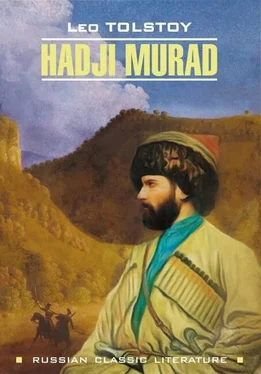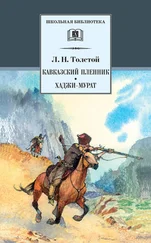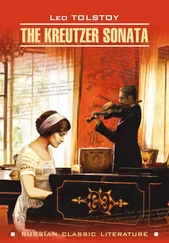Hadji Murad looked at Marya Dmitrievna and nodded in approval. Then he took the sword from Eldar and gave it to Ivan Matveevich. Ivan Matveevich took it and said to the interpreter:
“Tell him he must take my brown gelding. That is all I can give in return.”
Hadji Murad waved his hand in front of his face to show that he did not want anything and would not accept it. Then he pointed first to the mountains, then to his heart, and went to the door. Everyone followed. Some of the officers, who remained inside, drew the sword and after inspecting the blade decided it was a genuine gourda.
Butler accompanied Hadji Murad on to the steps outside. But just then something totally unexpected happened which might have cost Hadji Murad his life but for his promptness, determination and skill.
The villagers of Tash-Kichu, a Kumyk village, held Hadji Murad in high esteem and on many occasions had come to the fort just to have a look at the celebrated naib. Three days before Hadji Murad’s departure they sent messengers inviting him to attend their mosque on Friday. However, the Kumyk princes who resided at Tash-Kichu hated Hadji Murad and had a blood feud with him, and when they heard of the villagers’ invitation they would not allow him into the mosque. The people were roused by this and there was a fight between the villagers and the princes’ supporters. The Russian authorities restored peace among the mountaineers and sent a message to Hadji Murad instructing him not to attend the mosque. Hadji Murad did not go and everybody thought the matter was ended.
But at the very moment of Hadji Murad’s departure, when he went out on to the steps and the horses stood waiting outside, one of the Kumyk princes, Arslan-Khan, who was known to Butler and Ivan Matveevich, rode up to the house.
Seeing Hadji Murad he drew his pistol from his belt and aimed it at him. But before Arslan-Khan could fire, Hadji Murad, despite his lameness, sprang like a cat from the steps towards him. Arslan-Khan fired and missed. Hadji Murad meanwhile had run up to him, and with one hand seized his horse’s bridle and with the other pulled out his dagger, shouting something in Tatar.
Butler and Eldar rushed up to the enemies at the same time and seized them by the arms. Hearing the shot, Ivan Matveevich also appeared.
“What do you mean by this, Arslan – creating mischief in my house!” he said, on discovering what had happened. “It’s no way to behave. Have it out with each other by all means, but keep it “out” and don’t go slaughtering people in my house.”
Arslan-Khan, a tiny man with a black mustache, got down from his horse, pale and shaking, and with a vicious look at Hadji Murad went off with Ivan Matveevich into the parlor. Hadji Murad went back to the horses, breathing heavily and smiling.
“Why did he want to kill you?” Butler asked him through the interpreter. The interpreter translated Hadji Murad’s reply: He says that it is our law. “Arslan has blood to avenge on him, that is why he wanted to kill him.”
“And what if he catches up with him on his journey?” asked Butler.
Hadji Murad smiled.
“What of it? If he kills me, it will be the will of Allah. Well, goodbye,” he said once more in Russian, and grasping his horse by the withers, looked round at those seeing him off and affectionately encountered Marya Dmitrievna’s eye.
“Goodbye, good lady,” he said to her. “Thank you.”
“May God only grant you can get your family free,” repeated Marya Dmitrievna.
Hadji Murad did not understand what she said, but he understood her concern for him and nodded to her.
“Be sure you don’t forget your kunak,” said Butler.
“Tell him I am his true friend and will never forget him,” Hadji Murad replied through the interpreter. Then, despite his crooked leg, as soon as his foot touched the stirrup he swung his body quickly and effortlessly on to the high saddle and, straightening his sword and with a customary hand fingering his pistol, he rode off from Ivan Matveevich’s house with that particular proud, warlike air the mountaineers have when on horseback. Khanefi and Eldar also mounted and, after bidding friendly farewells to their hosts and the officers, set off at a trot after their murshid.
As always happens, a discussion started about the person who had left.
“He’s a great fellow!”
“It was just like a wolf the way he went for Arslan-Khan. There was a completely different look on his face.”
“He will do us down,” said Petrokovsky. “He must be a right rogue.”
“Then I wish there were more Russian rogues like him,” interposed Marya Dmitrievna with sudden annoyance. “He was with us for a week and he couldn’t have been nicer,” she said. “Polite and wise and fair-minded he was.”
“How did you find all that out?”
“I just did.”
“Fallen for him, have you?” said Ivan Matveevich, coming in. “It’s a fact.”
“All right, so I’ve fallen for him. What’s that to you? I just don’t see why you speak ill of somebody when he is a good man. He may be a Tatar, but he is a good man.”
“Quite right, Marya Dmitrievna,” said Butler. Good for you to stand up for him.
The life of those living in the advanced fortresses on the Chechnia Line went on as before. In the interval there had been two alarms; foot-soldiers came running out, Cossacks and militia galloped in pursuit, but on neither occasion were they able to apprehend the mountaineers. They got away, and on one occasion at Vozdvizhenskoe drove off eight Cossack horses which were being watered and killed a Cossack. There had been no Russian raids since the one which had destroyed the village. But a major expedition into Greater Chechnia was expected following the appointment of Prince Baryatinsky as commander of the Left Flank.
On arriving in Grozny, being now in command of the whole Left Flank, Prince Baryatinsky (a friend of the Crown Prince and former commander of the Kabarda Regiment) at once assembled a force to continue the fulfillment of the Emperor’s instructions which Chernyshev had communicated to Vorontsov. The column set out from Vozdvizhenskoe, where it had assembled, and took up position on the road to Kurinskoe. The troops camped there and engaged in forest clearing.
Young Vorontsov lived in a magnificent fabric tent; his wife, Marya Vasilevna, would drive out to the camp and often stayed overnight. Baryatinsky’s relations with Marya Vasilevna were a matter of common knowledge, and she was coarsely abused by the officers unconnected with the court and by the ordinary soldiers, who because of her presence in the camp were sent out on night picket duty. It was usual for the mountaineers to bring up their cannon and fire into the camp. The shots they fired mostly missed their target so as a rule no action was taken against them. But to prevent the mountaineers bringing up their guns and frightening Marya Vasilevna pickets were sent out. To go on picket every night to save a lady from being frightened was an insult and an offense, and the soldiers and the officers not received in the best society had some choice names for Marya Vasilevna.
Butler took leave from the fort and paid a visit to the column in order to see old comrades from the Corps of Pages and his regiment, now serving in the Kura Regiment or as aides-de-camp or adjutants on the stay He found it all very enjoyable from the start. He stayed in Poltoratsky’s tent and there found a number of people he knew who were delighted to see him. He also went to see Vorontsov, whom he knew slightly, having once served in the same regiment with him. Vorontsov made him very welcome. He introduced him to Prince Baryatinsky and invited him to the farewell dinner he was giving to General Kozlovsky, Baryatinsky’s predecessor as commander of the Left Flank.
Читать дальше
Конец ознакомительного отрывка
Купить книгу












